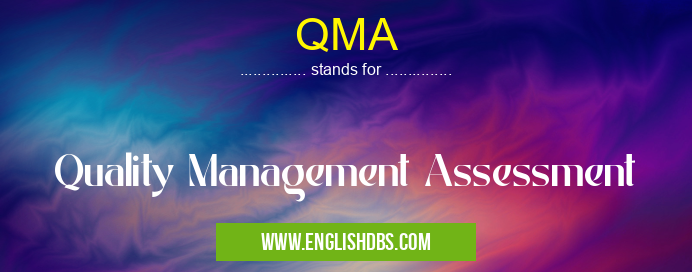What does QMA mean in MANAGEMENT
QMA (Quality Management Assessment) is a comprehensive evaluation process used to assess the effectiveness and efficiency of an organization's quality management system (QMS). It helps organizations identify areas for improvement and ensure compliance with regulatory requirements.

QMA meaning in Management in Business
QMA mostly used in an acronym Management in Category Business that means Quality Management Assessment
Shorthand: QMA,
Full Form: Quality Management Assessment
For more information of "Quality Management Assessment", see the section below.
» Business » Management
Definition
QMA is a systematic review of an organization's QMS, covering various aspects such as:
- Quality policies and objectives
- Processes and procedures
- Resources and infrastructure
- Measurement and analysis
- Continual improvement
Purpose
The primary purpose of a QMA is to:
- Evaluate the effectiveness of the QMS in meeting customer requirements and organizational objectives
- Identify areas for improvement and enhance the overall performance of the QMS
- Ensure compliance with regulatory standards and industry best practices
- Provide a roadmap for continuous improvement and quality enhancement
Benefits
Organizations that undergo a QMA can reap several benefits, including:
- Improved customer satisfaction and loyalty
- Enhanced efficiency and productivity
- Reduced costs and waste
- Increased compliance and reduced legal risks
- Improved decision-making and risk management
Process
A typical QMA process involves several steps:
- Planning: Defining the scope and objectives of the assessment
- Data Collection: Gathering information through interviews, document reviews, and observations
- Analysis: Evaluating the data and identifying strengths and weaknesses
- Recommendation: Providing recommendations for improvement
- Follow-up: Monitoring the implementation of improvements and their impact on the QMS
Essential Questions and Answers on Quality Management Assessment in "BUSINESS»MANAGEMENT"
What is Quality Management Assessment (QMA)?
QMA is a systematic and objective evaluation of an organization's quality management system to determine its effectiveness in meeting customer requirements and organizational objectives.
Who conducts QMA?
QMA can be conducted by internal auditors within the organization or by external auditors from a certified body. Internal audits help organizations identify areas for improvement, while external audits provide an independent assessment of the system's compliance with standards.
What are the benefits of QMA?
QMA helps organizations:
- Identify areas for improvement in their quality management system
- Enhance customer satisfaction by delivering consistent and high-quality products or services
- Reduce waste and inefficiencies by optimizing processes
- Gain a competitive advantage by demonstrating commitment to quality
What is the process of QMA?
The QMA process typically involves:
- Planning and preparation
- Document review
- On-site assessment
- Reporting and follow-up
What are the key elements of an effective QMA?
An effective QMA should:
- Be based on recognized quality management standards or frameworks
- Be tailored to the specific organization's needs
- Involve all relevant stakeholders
- Be conducted regularly to ensure ongoing improvement
Final Words: QMA is a valuable tool for organizations looking to enhance their quality management practices. By undergoing a thorough assessment, organizations can gain insights into their QMS, identify areas for improvement, and ultimately achieve excellence in quality and customer satisfaction.
QMA also stands for: |
|
| All stands for QMA |
